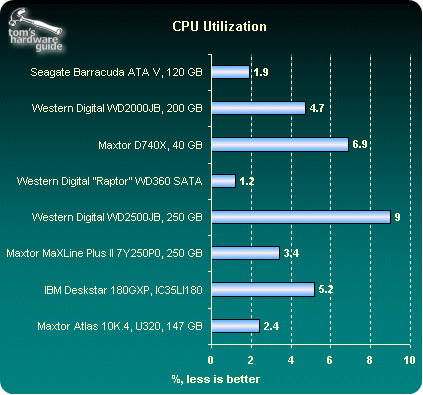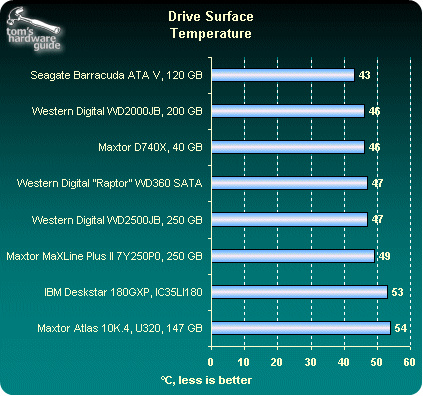SATA Hard Drive with a Kick: Western Digital's Raptor Put to the Test
Benchmark Results, Continued


Summary: High-Flyer With Future Potential
We haven't seen such a convincing set of benchmark results as this in a long while. The Raptor does justice to its name and strikes home wherever possible. Achieving over 60 MB/s makes it the fastest IDE hard disk drive we have tested to date. Even more impressive is the minimum transfer rate, which, standing at over 40 MB/s, equals the same high rate of the Maxtor Atlas 10K.4 we chose to use as an example to represent the SCSI faction with its Ultra320 interface. Achieving just under 70 MB/s, the 10K.4 did, however, teach the Raptor a little respect again.
These were not the only high results achieved. With 8.3 ms, the access time is not quite as good as that of the Atlas 10K.4. However, this is due to the fact that this Maxtor board with 10,000 rpm currently ranks among the fastest models. The WD360 scores highly in terms of the I/O performance so important in the server sector, outperforming even the 10K.4. Last but not least, it also achieves better results in terms of application performance and does not heat up as much as the SCSI drive, thereby suggesting a possible application in the high-performance desktop sector. Using a Raptor as a system hard disk drive, and a slower and much larger model as a data board would appear to be a sensible idea.
In summary, it is possible to state one fact for sure: wherever the bandwidth of an SCSI infrastructure is not absolutely essential, i.e., in the entry-level sector, Western Digital stands good chances of sweeping the board big time! The interface has potential and the Raptor offers sound performance. However, the challenge now would be to pursue this new course further and to offer even greater capacities in the near future.
Stay on the Cutting Edge
Join the experts who read Tom's Hardware for the inside track on enthusiast PC tech news — and have for over 25 years. We'll send breaking news and in-depth reviews of CPUs, GPUs, AI, maker hardware and more straight to your inbox.
Most Popular

